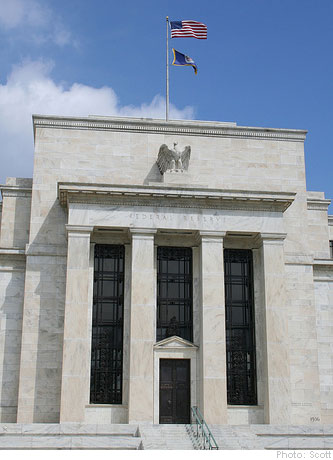 I have been active in criticizing recent Fed policy, but avoided the controversy over Fed governance (“Audit the Fed”). I worked for the Dallas Fed for 12 years and believed then, and continue to believe, that there is a legitimate private banking function that the Fed performs. It was born as a bankers’ bank, a successor to the private clearinghouses. As explained by Richard Timberlake, legal ambiguity surrounded some of the activities of the private clearinghouses (e.g., provision of reserves in times of distress). The Fed was the compromise.
I have been active in criticizing recent Fed policy, but avoided the controversy over Fed governance (“Audit the Fed”). I worked for the Dallas Fed for 12 years and believed then, and continue to believe, that there is a legitimate private banking function that the Fed performs. It was born as a bankers’ bank, a successor to the private clearinghouses. As explained by Richard Timberlake, legal ambiguity surrounded some of the activities of the private clearinghouses (e.g., provision of reserves in times of distress). The Fed was the compromise.
The courts have consistently upheld that the 12 Reserve Banks are not part of the government. The presidents are selected by a board of directors, and not subject to Senate confirmation.Their employees are not U.S. officials, not subject to civil service protection, and are private by a variety of legal tests.
The Board of Governors of the Federal Reserve System are an entirely different matter. They are nominated by the President and appointed by the Senate. The Board’s employees are constructively government employees.
So the Federal Reserve system is a complicated private/public entitiy. Bureaucrats being bureaucrats and lawyers being lawyers, the Fed has tried to have its cake and eat it: public when it suits it; and private when it suits it. The rubber hits the road over its “independence.” Indepedent of what?
The Fed is a creature of Congress and subject to whatever oversight that Congress deems appropriate. The current debate is over whether the Fed’s monetary operations should be audited. The Fed claims that would interfere with its operational independence. Yet every private entity is audited without interfering with its ability to operate. This is a sham argument.
I’m not normally a fan of op-eds by politicians. But Cong. Ron Paul and Sen Jim DeMint have a singularly intelligent piece in the Wall Street Journal on the issue. I don’t support every single thing they say, but I find them saying sensible things. Decide for yourself.
- Bulenox: Get 45% to 91% OFF ... Use Discount Code: UNO
- Risk Our Money Not Yours | Get 50% to 90% OFF ... Use Discount Code: MMBVBKSM
Disclaimer: This page contains affiliate links. If you choose to make a purchase after clicking a link, we may receive a commission at no additional cost to you. Thank you for your support!


Leave a Reply